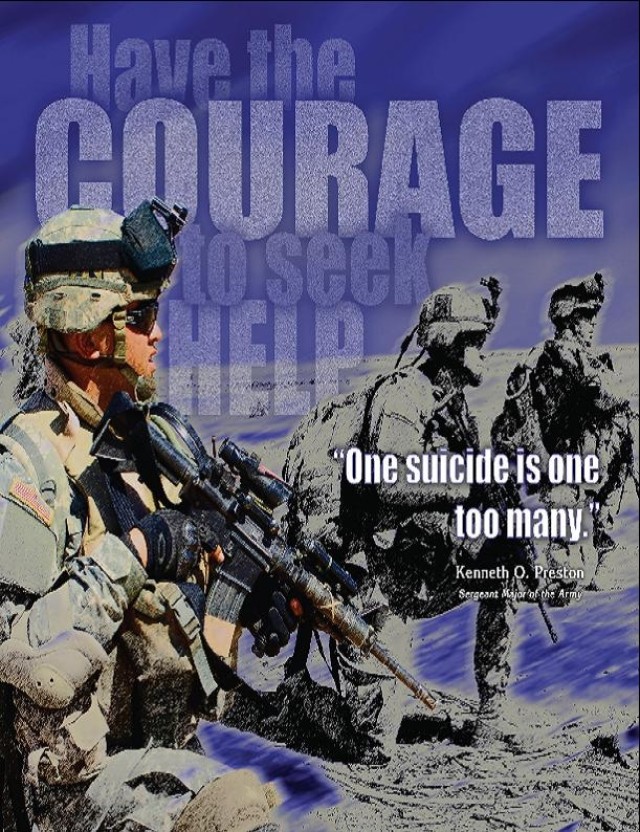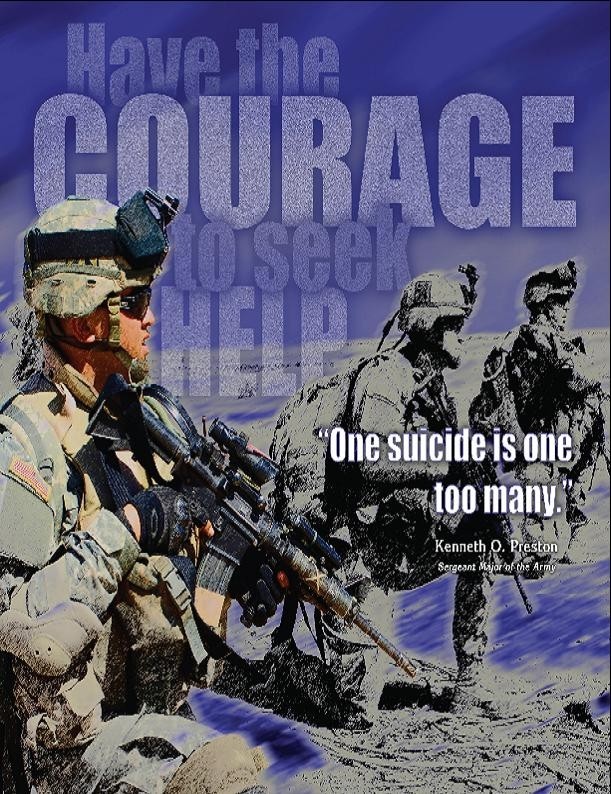WASHINGTON (Army News Service, Sept. 12, 2007) - In the face of rising suicide rates among Soldiers, the Army is making a renewed effort to help Soldiers at risk and educate Soldiers and leaders about the signs to look for in their battle buddies and subordinates.
That education is crucial in saving Soldiers' lives, said retired 1st Sgt. Cornell Swanier. He has first-hand experience with suicide - as a prevention-education coordinator, as a noncommissioned officer who lost a Soldier and as a combat veteran with post-traumatic stress disorder who has thought about killing himself.
On Thanksgiving Day, 2002, he got the call every leader dreads. One of the Soldiers he had brought safely through a deployment to Kuwait for Operation Enduring Freedom was dead by his own hand, an event 1st Sgt. Swanier is still trying to comprehend.
"I really got close to my Soldiers," he said. "I really tried to know the Soldiers, know their families, from top to bottom. It was tough on me. It's still tough on me to this day to walk in the barracks room and to see a dead Soldier. When Thanksgiving comes around, I think about that Soldier."
The specialist had been very intelligent, a model Soldier in a model section. He was a little quiet and prone to being picked on by his fellow Soldiers, but 1st Sgt. Swanier said he got along well with his section, one of the best in his company.
1st Sgt. Swanier said he felt responsible for a long time, but no one had any idea the Soldier wanted to kill himself. He even bought new speakers for his car shortly before he died. But he had planned the whole thing, bought a gun, even detailed where he wanted his ashes scattered in his suicide note.
After he died, 1st Sgt. Swanier went through all of the paperwork from the Soldier's monthly counseling sessions and couldn't find anything that would suggest suicide.
1st Sgt. Swanier had served as a prevention-education coordinator at Fort Benning, Ga., so he knew the signs to look for: Soldiers who start giving things away, whose job performance goes downhill, who isolate themselves and stop socializing and, of course, Soldiers who talk about killing themselves.
"You have to take that seriously. I'm sure that Soldier was exhibiting some signs around his roommate and fellow Soldiers, and they just didn't know it," he said.
The suicide, he continued, touched everyone in the close-knit unit. "It really dragged us down, put a somber mood on the unit for some time. It took us time to move forward."
The mission came first, however, and they were deployed for the initial ground war in Iraq in March 2003, a deployment that triggered 1st Sgt. Swanier's own battle with post-traumatic stress disorder and thoughts of suicide.
Until a year after his return, when his father mentioned how angry he was, 1st Sgt. Swanier didn't realize how PTSD was affecting his life - he had cancelled several appointments with specialists and avoided group therapy.
"There were many sleepless nights. Depressed days. I would sit in one spot for most of the day. I would isolate and I wouldn't go out. I wouldn't talk to anybody. I wouldn't answer the telephone. I would get up in the middle of the night and make sure all my doors and windows were secured," he said.
He never attempted it, but 1st Sgt. Swanier also thought about killing himself. He still does occasionally. He doesn't even like to wear neckties, although now he feels comfortable talking about it with his wife.
If it hadn't been for the conversation with his father, 1st Sgt. Swanier believes he would have lost his family and ended up divorced. Instead, he joined an outpatient program at the local Department of Veterans Affairs post-traumatic stress clinic.
"When you mention the words mental health or behavioral health, there's a stigma," he said. "And I'm a first sergeant. We were coming back and that place was full of Soldiers, no leaders. And I just couldn't see myself going to behavioral health. I'm the type of person who was used to going up there and checking on Soldiers."
1st Sgt. Swanier said his wife and daughter didn't understand at first, but that their support has gotten him through his treatment. Talking to other veterans who know what he's going through also helps, he said.
He tells Soldiers and leaders that they shouldn't be afraid to get help because PTSD is just like any other disease.
"We treat it and move on with our lives. This is no different. It's just a different part of our body. It starts with you, then it affects your family, then your community. There is a snowball effect if you don't get help. Because if you're going through post-traumatic stress disorder, your Family's going through secondary post-traumatic stress disorder," he said.
"If you want to help your career, get help. In the long run, if you're a leader and you have issues, you don't understand what you're doing. It'll definitely affect readiness. You're weak if you don't go. I think we're to a time now where everybody understands, okay, it's out there."
As with suicide, 1st Sgt. Swanier emphasizes the importance of education so Families, leaders, Soldiers and even Army Civilians know when to get Soldiers help and how to support them.
"I want to be able to help other Soldiers and also be an advocate for post-traumatic stress disorders. It can happen to anybody. We've got to get rid of that stigma," he said.
Under the Army Medical Action Plan, the Army is working hard to do just that. The service has launched the chain-teaching program to teach all Soldiers how to recognize the symptoms of PTSD and realize their careers are not in danger if they seek help. The Army also conducts mental-health assessments of Soldiers before, during and after deployments.


Social Sharing